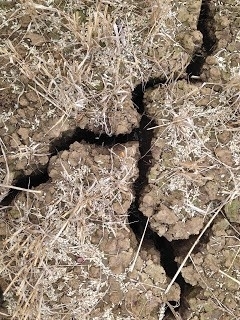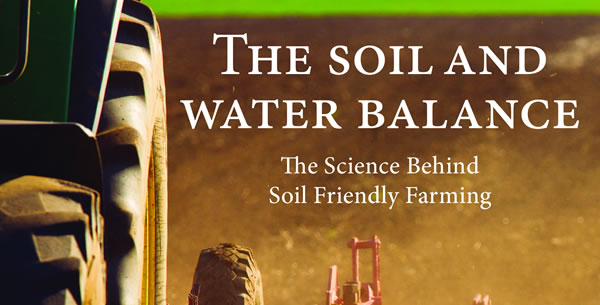Brexit has been a preoccupation for the UK for more than two years and while the expected impacts on our economy have been published, the consequences for farming, food security and the farmed environment remain unclear. What is increasingly accepted is that the process has become a distraction from very much larger issues with even more severe and far reaching implications.

Parched soil at Loddington in summer 2018
The most recent United Nations annual Emissions Gap reportspelled out the very real threats arising from failure to meet the 1.5C target set in Paris in 2016, but last month’s UN talks in Poland resulted in agreement over little more than how to monitor the deterioration in our global climate. When it comes to climate change, 'no deal' is infinitely more serious than it is for Brexit.In the autumn, the World Meteorological Organization reported that 2018 was set to be the fourth warmest year on record, meaning that the four most recent years have also been the warmest. The most recent greenhouse gas concentration records for carbon dioxide, methane and nitrous oxide are respectively, 146%, 257% and 122% above pre-industrial levels. The implications globally are enormous, but the 2018 drought across Europe represents one recent regional symptom that is consistent with climate change projections.
Recognition of these trends has prompted calls for increased resilience in our food production systems, and in flood risk management and multiple other areas of our national infrastructure and systems. Our research at the Allerton Project plays a small part in advancing our knowledge about practical approaches to building resilience. Direct drilling can potentially increase soil moisture available to crops in drought, and reduce sedimentation of drainage channels in flood prone areas. Deep-rooting agricultural grass cultivars have similar potential. The permeable dams we have introduced into our landscape scale Water Friendly Farming experiment are specifically designed to hold back water in headwaters and reduce flood risk downstream.
But while this is a pragmatic response to a changing climate, is the emphasis on building resilience also a distraction from the real need for mitigation? Are we treating the symptoms at the expense of the search for a cure? Does such an approach even encourage complacency?
Food production is responsible for about 10% of greenhouse gas emissions, although this proportion could increase to 30% by 2030, as other sectors take steps to reduce theirs. ‘Industry’ and ‘travel’ currently dominate greenhouse gas emissions, but thinking in terms of broad sectors such as these is not necessarily helpful. In the end, it is largely the users of these services, individuals and individual businesses of all types (as well as policy makers of course), who have the responsibility and power to contribute to a reduction in emissions.
At the Allerton Project, reducing tillage intensity cuts down on fuel use, and we are developing plans with our partners in the Sustainable Intensification research Platform (SIP) to understand better, and to address the issue of greenhouse gas emissions across arable and livestock systems. Solar panels and wood fuel heating of our buildings also reduce the need for fossil fuels, and an increasing focus on nitrogen use efficiency could help to do the same. On a more individual basis, teleconferences, Skype calls and home working reduce the need for travel, and using alternatives to air travel for international journeys wherever possible also reduces emissions.
The social and economic pressures to adopt a lifestyle that contributes to climate change are considerable. A change is needed to address this, at both personal and policy levels. Many feel that the impacts of climate change do not apply to them, and accept little responsibility for its mitigation. The science demonstrates very clearly that this is misguided. The developing evidence also indicates that there are multiple ways of achieving the necessary changes, and individuals and businesses can adopt different strategies. As in so many things, diversity is a strength. Carrying on as usual is not a resolution, and ultimately, nor is it an option.

Get the inside track on soil and water research
Priced now at just £4.95 (50% off), The Soil & Water Balance is a handy paperback which provides the inside track on soil and water research.
Presented in a Q&A style, much like our popular Moorland Balance, this 100-page book looks at the problems and solutions on topics ranging from erosion and contamination, to the impact on songbirds and other wildlife.
Combining years of research at the GWCT's Allerton Project demonstration farm with tens of external scientific papers, this is a fascinating study of how farming can adapt to the challenges it currently faces.
View Book >
or
Buy Now - £4.95 >
100% Secure. All Credit & Debit cards, PayPal, Apple Pay and Google Pay accepted.
